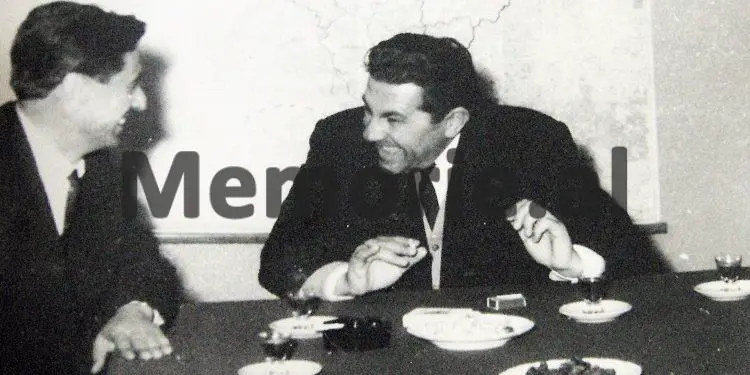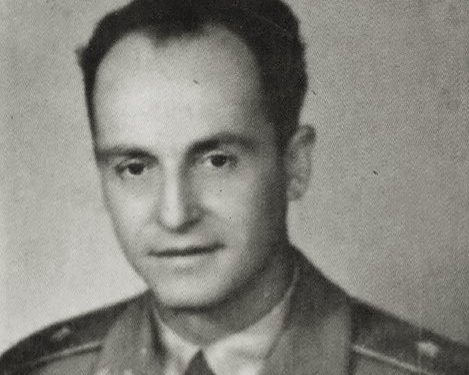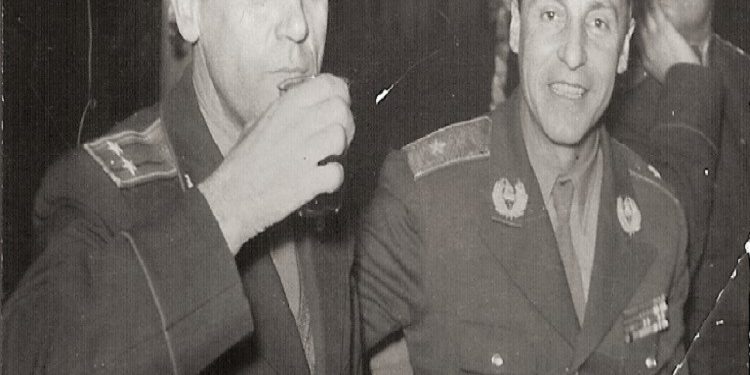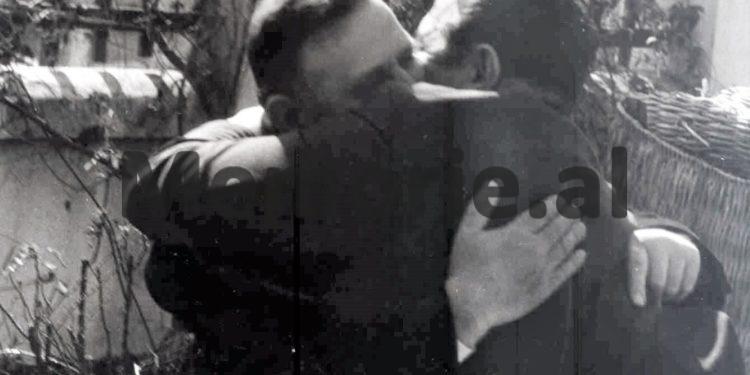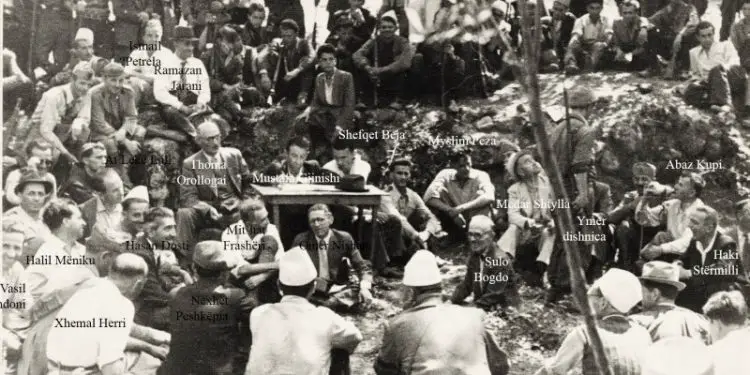The third part
-A book about the criminal activity of Hoxha…!-
Memorie.al / In his book “Prapaskenat kobzeza e Enver Hoxha”, published in 2008, Major General Ernest Jakova makes a scan of all the criminal activity of the dictator Enver Hoxha, both during the years of the War and after, with his installation of one of the harshest dictatorships. For the post-war period, the author mainly stops and analyzes the situation in the Army and behind the scenes in the Ministry of Defense. His book, as a close witness in many affected events, is a valuable reference for researchers, while for readers; it is worth returning attention to this book, especially these times, when thoughts are being articulated for a rehabilitation of the figure of Enver Hoxha…!
After analyzing in three chapters of the book, many theses that deal with his behind-the-scenes leadership of the Communist Party, but also of the War against Nazi-fascist occupiers, and further the installation of the most brutal methods of dictatorship and behind-the-scenes with hostile groups in the army, Major General Ernest Jakova, poses in his book, 17 questions and answers that many may have articulated these three decades after the fall of communism. And at the end of 17 questions, he brings an epilogue to the issue he deals with summarized in 6 conclusions.
Continues from last issue
- Mr. Jakova, can there be rehabilitation for Enver Hoxha?
Rehabilitation is provided for by law. Those persons who have been unjustly punished based on the law are rehabilitated. Thus, all those who were unjustly punished by the dictatorial regime of Enver Hoxha, have been rehabilitated individually by trial and collectively, by decision of the People’s Assembly, returning to them the decorations that were taken from them.
For Enver Hoxha, the case is different: he has never been unjustly punished for anything by the judicial bodies. So, Enver Hoxha has nothing to rehabilitate. On the contrary, his numerous crimes and treasons, which are punishable by law, had remained untried and condemned for a long time.
In these conditions, the Albanian people (sovereign), after losing their patience, on February 20, 1991, rightly severely punished Enver Hoxha, tearing down his memorial in “Skënderbej Square” in Tirana and in all the cities of Albania. . The fact that his family continues to receive the reward for his decorations, shows that Enver Hoxha has not yet been legally punished by the competent bodies. Why this delay, or neglect, unjustifiable?!
- How many types of Enverists are there?
There are two types of Enverists: 1) from those who have come to the aid of Enver Hoxha, for committing his crimes and betrayals, which protect Enver Hoxha, to protect themselves. 2) There are also those who did not participate in Enver Hoxha’s crimes, but as nostalgic, they believe that along with communism, Enver Hoxha will also be rehabilitated.
Both of these types of Enverists alike try to deny and hide Enver Hoxha’s crimes and betrayals, and this is a negative attitude that shames you. But the punishment and exposure of Enver Hoxha’s crimes and betrayals is a positive attitude that honors you.
- Are archival data always true?
Not always. For things of a political nature, the archives can be divided into partisan and non-partisan. The first ones present more lies. The second ones present more of the truth. The full truth is presented by non-partisan historians. Party historians cannot be considered historians. So, the archival data on the issues of the National Liberation War and after the war, of the ALP, of the “National Front” and of “Legality”, cannot present the truth, because the issues are presented according to party interests.
Thus, the ALP hides and denies the behind-the-scenes of Enver Hoxha and its support of Yugoslav interests in Albania. Like the “National Front”, it hides and denies participating with forces in the joint operations with the Germans, for the annihilation of the National Liberation Army. Just as “Legality” hides and denies the silent cooperation with the German, so as not to attack each other.
In this particular case, efforts have been made for the data of this book to present the truth as they are contemporaries and active participants in the events and I have put myself in the role of a non-partisan historian in dealing with the issues. How far I have achieved this, the readers will say.
- Why Mehmet Shehu and Beqir Balluku interrupted their studies at the “Voroshilov” Military Academy of the Soviet Union and did not finish it?
Because Enver Hoxha himself was without any kind of higher education and could not allow them to rise above him as military ideologues, when he himself should have been one. Mehmet Shehu, interrupted his studies after six months, under the pretext that he was allegedly going to attack the Greek. Beqir Balluku, stopped his studies after a year, because the army allegedly needed him.
The education of the army cadres, which was a necessary need for strengthening the army and increasing its combat readiness, contradicted the personal interests of Enver Hoxha, as he was uneducated. That is why he, out of great fear, has always considered the army’s senior cadres as his opponents and, as has been said above, liquidated them by calling them enemies and declared himself the savior of Albania.
Outcome
Enver Hoxha, as the leader of the Albanian people, during the years of the Anti-Fascist National Liberation War and after the liberation of Albania, turns out to have been a “criminal and coward” and a “traitor with a black face”.
Placed in the highest leadership positions: chairman of the Albanian Communist Party (APP), Commander-in-Chief of the Army and head of state, as the most unsuitable pro-Yugoslav, with the approval of Tito and Stalin, he played in Albania, the role of “Trojan horse” and that of “agent and poly agent” in their service.
In the service of Tito, he has done a lot to pave the way for the annexation of Albania, as the seventh republic of Yugoslavia, which was not realized due to Tito’s own fault. In the service of Stalin, he established the “communist dictatorship” in Albania, which liquidated all the “democratic victories” of our National Liberation War.
In the event that a person, who kills behind the back or with false accusations high-ranking officers of the Army and the state for his personal interests, is called a “criminal”. Enver Hoxha has so many of them, he turns out to be a monster criminal. So, his main crimes were: a) the assassination behind the back of Mustafa Gjinishi, Qemal Stafa and many other high officials at the request of Miladin Popovic.
b) The elimination of the main military cadres of the Army twice: those of the War to grab the glory of leading the war and those of the post-war, from the great imaginary fear that you had captured as the coward that he was. c) Imprisonment and indefinite exile of hundreds of thousands of innocent people, with their entire families, where many of them died. And other cases like these.
If a person comes to the aid of foreigners to the detriment of the interests of his country, he is called a “traitor”. Enver Hoxha has a lot of them. So, his main betrayals were: a) sabotaging the decisions of the Peza Conference and killing Mustafa Gjinishi behind his back, in the efforts to make possible the annexation of Albania as the seventh republic of Yugoslavia.
b) The establishment of the communist dictatorship in Albania, which liquidated all the democratic victories of the great and glorious National Liberation War of the Albanian people, with all its negative consequences for the Albanian people. And many others. So, his crimes and betrayals against the country are intertwined.
Enver Hoxha, without military education and without war experience, had never led a military unit in combat, with mediocre intellect and cowardice, inability to overcome fear, which in case of danger was hidden, leaving the Army without direction and himself without an address as Commander-in-Chief of the Army, it was completely formal.
In these conditions, the leadership of the Army in the war was done by the Chief of General Staff, Major Spiro Moisiu, together with the corps commanders: Mehmet Shehu, Dali Ndreu, Tuk Jakova, Tahir Kadareja, etc., who with skill and courage, brave true legendary heroes, failed all the enemy’s operations, liberated the North and led the war to victory, until the complete liberation of Albania.
He was also incapable of managing the country’s economy. He talked a lot: “Science”, “Science”, when most of the state enterprises and most of the agricultural cooperatives were in deficit and required funding from the state. He also destroyed the yard of the cooperators, which was his stupidity. The achievements in the economy have been so small that he left Albania “the poorest country in Europe”. His only achievement is behind the scenes.
His main criminal weapons have been: a) The Party, which Enver Hoxha has used as the “magic wand that works wonders”: “The Party did it” and the Party was infallible, and by equating himself with the Party, he also came out infallible. And, while Shyqyri Ishmi and others, in front of the rope, shouted like patriots with great pride: “Long lives the Party”! And “Long live Albania”! For Enver Hoxha, the party was a “game”!
b) The behind-the-scenes he devised, based on the use of deception and violence, according to his dictatorial criminal concepts. c) The laws of the state, making them such that they facilitated his criminal activity, such as the infamous agitation and propaganda law.
The Anti-Fascist National Liberation War of the Albanian People, as its name is, is a magnificent work of the heroic and freedom-loving Albanian people, who immediately responded to the call of the “Peza Pluralist Conference”, continuously filling the partisan formations with new volunteers, took over and led the war until the complete liberation of Albania.
Directing it with his best sons who were brigade, assault division and corps commanders, who led heroically, achieving high results until the failure of all the successive most dangerous operations of the enemy during the winter of 1943-1944, precisely during the time that the coward Enver Hoxha was hiding in the mountains of Martanesh and led the war, until the final victory, in the complete liberation of Albania.
So, the glory of leading the National Liberation War belongs entirely to the commanders of the army units, the brave and true heroes and not the coward Enver Hoxha, who hid and left the Army without direction. The exposure of this attitude of his lifts up and makes more visible the great role of the Albanian people, who made the war, and of his sons, who led it.
So, with the unmasking of Enver Hoxha, the greatness and glory of the Anti-Fascist National Liberation War of the Albanian people, known and respected by the whole world, rises to an even higher level.
- The pluralist “Peza Conference” is the work of the prominent patriot Mustafa Gjinishi. She, with her majestic call; “Everyone in the war, against the Italian fascist occupier, regardless of religion, region and ideas”, gave a great boost to the Anti-Fascist National Liberation War of the Albanian people and remains as magnificent and glorious as the war it inspired.
Enver Hoxha and the NPSH, after initially taking advantage of the great boost it gave to the National Liberation War, then moved on to not properly implementing its pluralist decisions, because they would prevent the realization of Yugoslav interests, aimed at annexation of Albania, as its seventh republic, which constitutes Enver Hoxha’s high treason against the motherland.
For its great importance, the Conference of Peza is commemorated every year on September 16, with the great heroic Peza in an extremely festive manner. This day of celebration is good for the Albanian people, who have meticulously implemented their pluralist historical decisions. This day also reminds you of Enver Hoxha, but as a saboteur of the pluralist decisions of the Peza Conference. This celebration opens with the speech of the government delegate.
But, it often happens that behind him, leaders of unauthorized left parties, give speeches that sound like boasting without right, the criminal and traitor Enver Hoxha and being cheered by some specially gathered people, which seriously damage the very happy state of the party. So, the government must take measures so that this does not happen again.
- The Albanian people, very rightly, on February 20, 1992, overthrew the monument of Enver Hoxha, in “Skënderbej” square in Tirana and also in all the cities of Albania, as undeserving. In honor of the Anti-Fascist National Liberation War of the Albanian people, it is appropriate to erect several memorials as follows:
- a) In “Skënderbej” square: place next to each other in a group, the monuments of the heroic commanders of the units who led the war and led it to victory, in the complete liberation of Albania: Tuk Jakova, Mehmet Shehu, Dali Ndreu, Tahir Kadareja , Petrit Dume, Bedri Spahiu, Qemal Stafa, Nako Spiro.
The monument of each of these should also be placed in the center of the respective district (their number and names are debatable).
b) In honor of the Peza Conference, the monument of its creator and creator, the outstanding patriot Mustafa Gjinishi, should be erected in the heroic Peza. This should also be raised in his city of Peqin.
- “Civil war” in Albania between the forces of the National Front and the National Liberation Army did not exist during the entire war for the liberation of Albania, because: a) it did not exist until the Mukje Meeting.
- b) After the Meeting of Mukje, until the complete liberation of Albania, the forces of the “National Front” participated in joint military operations with the German forces, as collaborators, for the annihilation of the forces of the National Liberation Army, with the aim of take power so, here too, there was no civil war.
While the war for the liquidation of the nationalist forces of Muharrem Bajraktari and Gani Kryeziu from the National Liberation Army, at the end of the war after cooperating with them, in disloyalty, it was a civil war, because they were fighting the occupier.
In the book, the two fraudulent behind-the-scenes of the “National Front” have also been exposed: 1) “The time has not come” and 2) “Cooperation with the German occupier to annihilate the National Liberation Army and then cooperation with the Anglo-Soviet-American coalition, to take power”.
Both of these ideas, of Mit’hat Frashëri and “Balli Kombëtar”, considered “genius” but, in fact, they were traitorous “cobzeza”, did not deceive anyone, only themselves, and as such they failed.
Such a negative result has also been achieved by “Legality”, with its deceptive backstage, for cooperation in secret silence with the German occupier: “I don’t drive you, don’t drive me”, which is the same thing, treason against the homeland and how as such, it remains unjustifiable and non-rehabilitating.
We turn to the “Supreme Court”:
The Supreme Court at that time, in the service of the dictator Enver Hoxha, based on his unjust accusations against the main military cadres of the army, in 1975-1976, judged the case with his dictation and took extremely severe measures, with firing, imprisonment, exile and deportation with the whole family, for all of them.
But, from all the data above, it appears that the liquidation of the main cadres of the Army was done and remained unjustified, because: a) the accusation of “military coup”, from the investigations of the investigation and the Supreme Court, was not proved because there was none. He had existed only in the fantasy of Enver Hoxha.
b) Even the second accusation, which was made after the failure of the first one, that the Army cadres were against the Theses of the Defense Council, was also not proven, because the Theses of the Defense Council were based and presented entirely the ideas of the cadres the main military officers of the Army and they could not be against their ideas.
c) This proves that Beqir Balluku did not have other ideas called by Enver Hoxha; “Black theses”, when such were the “black ideas of bunkerization” of Enver Hoxha and those of having “two types of forces”, of Mehmet Shehu in the 12th Plenum of the Central Committee.
Thus, all the measures taken by the then Supreme Court, against the main cadres of the Army, were unfounded, unjust. Therefore, it is recommended that today’s Supreme Court: 1) Take the case back to trial once again, to cancel the unjust decisions taken against them.
2) To judge, as justice requires the criminal and treasonous actions of Enver Hoxha. It is up to the Albanian government, based on the decision of the Supreme Court, to take the necessary measures to honor them as the outstanding patriots they were and to reward their families. Memorie.al
(Prepared by Admirina Peçi)




